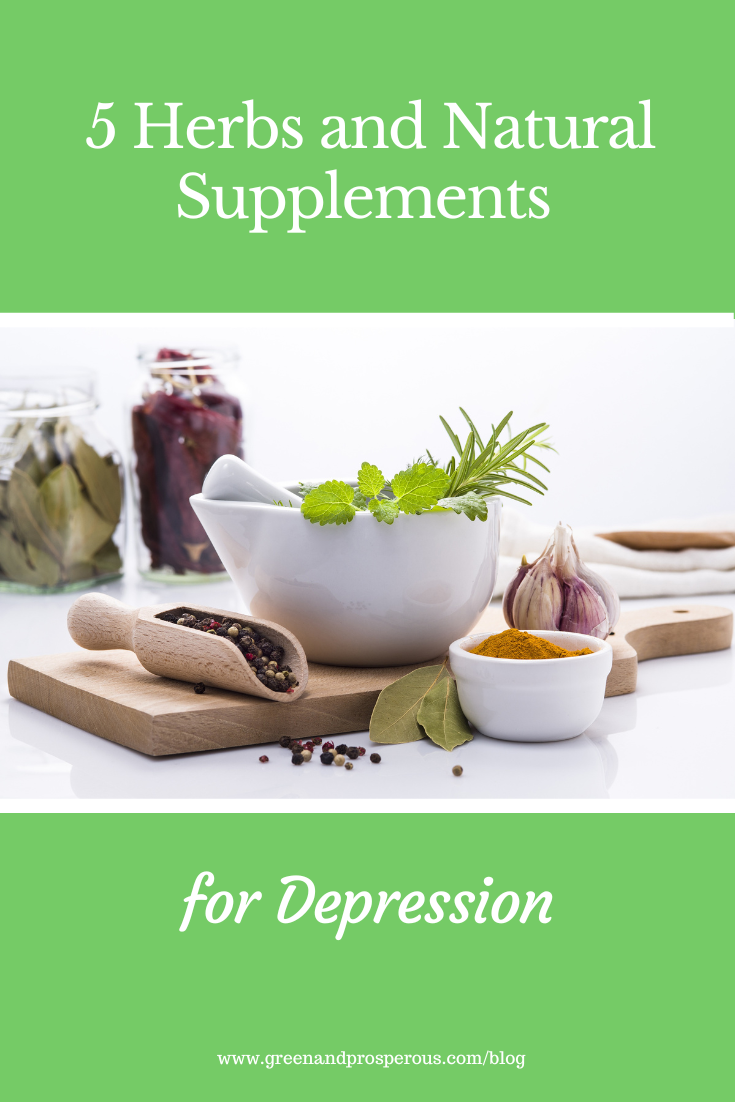5 Herbs and Natural Supplements for Depression
/According to Mental Health America, clinical depression has turned into one of America's most costly illnesses, which is why anti-depressant medicines have become the most commonly prescribed drugs in the United States of America. The use of herbs as treatments for various illnesses dates back to at least 3000 B.C. Today this practice is part of a broader movement recognized as complementary and alternative medicine.
Natural remedies are not a substitute for medical diagnosis and treatment for individuals suffering from depression. However, in some cases certain herbal and natural supplements have revealed promising results, but further studies are required to establish which herbs are most likely to assist & what side effects they might carry. Here are some herbs and natural supplements that show promise in alleviating clinical depression.
1. St. John's wort
St. John's wort (Hypericum perforatum), a plant traditionally used to send away evil spirits, is the most extensively studied herbal medicine for depression. St. John’s wort is a plant that is native to northern Africa, Europe, and western Asia. This herbal medicine is not approved by the Food & Drug Administration (FDA) to treat clinical depression in the U.S., but it is still a popular depression treatment remedy in Europe. The herb also contains anti-inflammatory characteristics, in addition to antibacterial and antiviral properties. Individuals have been known to use it to treat infections and wounds on the skin.
A couple of studies found that St. John’s wort was not successful in treating or alleviating severe depression. The first study compared the herb to a placebo. The study found that the herb was unsuccessful in improving the condition of the patient suffering from depression. The second study was published in the Journal of the American Medical Association. This study also didn't find the herb to be productive in easing moderate or severe depression. However, according to National Institutes of Health (NIH), St. John's wort may aid in treating milder forms of depression, although its effects haven’t been irrefutably established either way.
2. SAMe
S-adenosyl-L-methionine (SAMe) is a compound prepared naturally by the body. This supplement is designed to perform like a synthetic form of the body’s natural mood-boosting chemicals. The FDA approved artificial SAMe as a dietary supplement in the late 1990s. In Europe, SAMe has been used as a prescription drug since the 1970s. SAMe is prescribed to treat a number of conditions. It may assist in treating depression, heart disease, attention deficit-hyperactivity disorder (ADHD), and osteoarthritis.
In a 2010 study in The American Journal of Psychiatry, researchers examined the effectiveness of SAMe. They found that individuals taking prescription serotonin reuptake inhibitors (SRIs) may gain an advantage from taking SAMe. Researchers offered study participants 800 mgs of SAMe twice a day. The study showed that compared to individuals who took a placebo, participants who took SAMe showed fewer symptoms of major depressive disorder.
3. Omega-3 fatty acids
Omega-3s are also termed “essential fatty acids” because our body needs them for normal functions. They are significant for our neurological development and growth. Omega-3 fatty acids are a healthy type of fat that are found in cold-water fish such as trout, salmon & sardines. They are also available in supplement form and are also known as fish oil capsules. There are some studies which indicate that omega-3 fatty acids may assist in relieving the symptoms and signs of depression; however, the overall evidence is still not clear.
A 2003 study in European Neuropsychopharmacology found that individuals who consumed omega-3 fatty acid supplements showed reduced symptoms of depression. Even though consuming foods with omega-3 fatty acids has heart-healthy benefits, further research is required to establish whether they have an effect on preventing or alleviating depression.
4. Saffron
Saffron is a rare spice that is derived from a dried segment of a crocus, a flower in the iris family. Saffron has been employed for centuries to improve the body’s normal functioning, including strengthening digestion, improving mood, and augmenting relaxation. Currently, it is being studied as a potential alternative treatment for depression.
According to one study, saffron supplements significantly improved mood and lessened symptoms of major depressive disorder more than certain placebo supplements. The study, however, also mentioned that further research is required before saffron can become a commonly used alternative.
5. 5-HTP
Like this? Please pin!
This supplement, called 5-hydroxytryptophan or 5-HTP, is accessible over the counter in the U.S., but a prescription may be required in some countries to obtain it. 5-HTP is basically a chemical that the body naturally produces from L-tryptophan -- a protein building block. Similar to SAMe, 5-HTP may aid in increasing your brain’s serotonin levels. Drugs that boost serotonin tend to assist in easing the symptoms of depression.
Finding Supplements for Depression
Although supplements are not a cure for mental heath disorders, finding the best depression supplements to support mental health and well-being is crucial for individuals looking to improve their overall well-being. These supplements can provide essential nutrients and support for mental health, helping to alleviate symptoms of depression and promote a sense of balance and stability. It is important to consult with a healthcare professional before starting any new supplement regimen to ensure safety and effectiveness
About the Author:
Marcus Clarke regularly writes at writerzone and blogs at psysci, a psychology science blog that examines the latest research and explains how findings can impact and improve people’s lives.








































